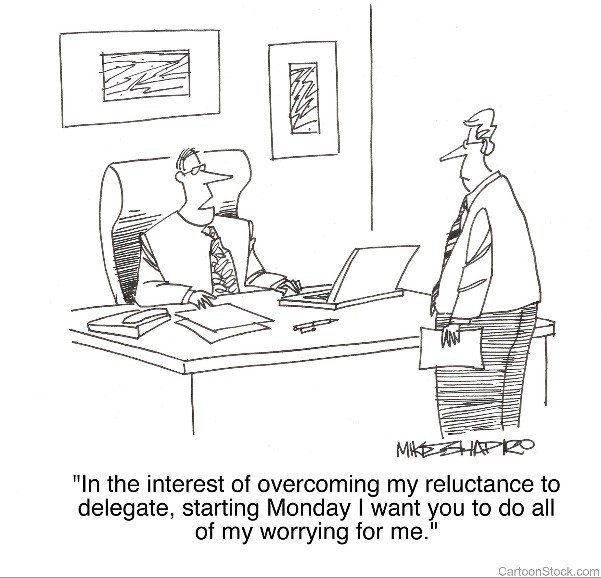
Successful individual contributors can derail when they manage other people. Here’s how to make sure that doesn’t happen to your career:
Congratulations, you’ve hit your targets, your influencing skills have been recognised and you have been rewarded with your own team to manage. These could be new hires, people you inherit, or trickiest of all, peers that now report to you.
I’ve seen many new managers stumble into one of these management styles:
1. The Control Freak Trap.
You have unfeasibly high standards, so end up micro-managing the performance of skilled team members, rather than risk a less than perfect job. You think you could do it better yourself, so end up completing their tasks when they’ve gone home. It’s easier than taking the time to explain it to people who aren’t committed to your high standards. Those high standards are what got you promoted after all.
2. The Superstar Trap.
You have management responsibilities but are still rewarded and measured mostly on your own performance. Logically, you spend as little time managing as you can get away with. You have 1:1s every Monday then leave them to get on with it for the rest of the week. Some of their performance isn’t up to scratch (these snowflakes are so lazy) but you are too busy to instigate a performance management system with them. With a bit of luck, they’ll get fed up and move on, so you can hire a self-sufficient replacement
3. The Mother Hen Trap.
You book yourself on a Mindful Management course so you can truly develop the latent talent in your team. Some of them have been bouncing around the business for a while, consistently delivering lack-lustre results. You are convinced that they’ll come good under your wing. You spend hours encouraging them, asking them how they feel about their performance and what they intend to do differently in future. Your boss suggests you move them out, but you are optimistic that in six months or so you’ll turn their performance around. In the meantime, you commit to picking up the slack yourself. You cancel your gym membership and postpone your holiday, so you can devote yourself to being the best manager you can be.
Ring any bells? None of these styles work – for you or the people that work for you.
Here’s four tips to make the tricky transition from individual contributor to successful management.
Follow them and your team will loyally follow you.
One: Eliminate some of your own workload
You were giving 100% of your focus and energy to your work before, which is why you have been rewarded with promotion. Something has to go. You can’t invent more hours. Negotiate what percentage of your week you are now supposed to spend managing and where you will find that time. What has to go?
This is a dilemma we’ve all faced and your own manager should have some helpful insights on how to get the balance right. You can’t do everything you did before. Can you change the way you work, so you get through your own priorities more efficiently?
Some tasks can be delegated to your team. They might not do it as well as you, but a manager’s job is to manage: not to do everything. Get your head round that.
Let go of your need to control everything. Once your employees are trained, skilled and motivated then let them get on with it. Don’t duplicate effort by micro-managing them. Get out of their way. Successful managers aim to build their team’s self-efficacy – belief in their own ability to set high goals and persist in the face of obstacles.
Staying in the weeds is a default behaviour for managers who don’t know how to be strategic. Block out some time to figure out what you should be doing instead, and get support if necessary.
Don’t moan about the workload, other departments, systems, clients, your boss. You are a role model now. Managers should be the most calm, positive and organised people in the room, giving out the vibe that they can handle even more responsibility, so are promotable to the next level.
Two: You’re a Manager, so Manage!
Commit to the role wholeheartedly, don’t shirk from it. ‘Manager’ isn’t just a job title that comes with length of service, it is a new skillset, set of behaviours and frame of mind for you to acquire.
The starting point is to ensure everyone in their team knows exactly what they are responsible for, with a crystal-clear job description and key performance indicators.
I always ask people on Crazy Busy productivity workshops for the top three priorities of their roles and how much time they actually spend on them. Frequently they aren’t sure what their priorities actually are. No wonder they go home stressed and frustrated – they don’t know what a good job looks like.
Inexperienced team members require clear instruction. Don’t waste time assuming they know what they are doing, or expect them to be mind-readers. Just because you figured this stuff out for yourself doesn’t mean everyone else can. Check they know what they are doing. When their skills are developed and you understand their strengths, weaknesses and idiosyncrasies, coach them to think for themselves.
Set clear guidelines too – on personal phone use, hours of work, communication standards, expected behaviours, meeting etiquette and so on. Don’t be passive aggressive/sarcastic about it, just be honest about what you want and lead by example.
People respect managers who challenge, inspire and thank them. Obviously be nice to them, but they don’t want you to be their best friend. They want you to push them to develop their skills and ultimately, achieve their career goals.
Three: Feedback liberally
Feedback should be part of everyday conversations, not saved up for an appraisal. I don’t mean unspecific ‘awesomes’, but telling people what they did well, so they can repeat it.
‘I really liked how you handled that fee negotiation by breaking down all the components of the service so they could see what they were getting.’
Encourage listening, introspection and learning:
Next time we face the same issues, what can we do to get that result more efficiently?
How do you think we can boost this performance?
Ask for feedback on your own performance too:
Where could you use more help from me? Where could you use less help now, so I can back off a bit?
Conversations don’t have to be ‘difficult’ if all your communication comes with positive intent – usually professional achievement of outcomes. Never make personal comments. Be specific about the behaviours you want to change and nip problems in the bud early on.
I’ve noticed that you have been late for the team meeting twice in a row, can we have a chat about that?
When you come in to work hungover and snappy like this morning, it has a really bad effect on everyone else’s mood. It’s up to you what you do in your own time, but you need to show up to work and act professionally please. Right, let’s crack on with it.
I saw that you were reading your emails during the presentation which made me think you aren’t very engaged. Is that the case? What’s going on?
If you have skilled team members whose performance lapses then perhaps they need more challenging tasks. Ask them. If their work continues to slip, despite your best interventions, then put a performance process in place. Don’t put your head in the sand. Sometimes the wrong decision is better than no decision.
Four: Get some boundaries
You won’t get your own work done if you are constantly interrupted, so put a process in place to make sure your reports don’t hijack your time. Ask them in the morning if they have everything they need to get their work and arrange a check in later in the day. This should give you – and them – scheduled time to get on with work without interruptions.
If there are serial interrupters, it could be that you haven’t done enough training/standard setting, as explained above. Or that they need your approval. Counter-intuitively, more quick informal conversations WITH them, at a time to suit you, will build their confidence and give you more time AWAY from them. Clinic-style sessions ‘I’m free from 4 pm every day if you need my input’ will mean you can hold off the constant queries and deal with them in batches, rather than be constantly distracted.
Finally, don’t feel you need all the answers. Great managers know their strengths, get feedback on their blind spots and aren’t frightened to admit their mistakes.
What can I do for you?
Contact me if your managers need executive coaching. We’ll start with some 360 degree feedback to give us data to work from: more info here
I’m running a Crazy Busy session at BAFTA for the London Business Forum on 2nd April, book here for tickets: more info here
Click here for my in-house conference and team events like Crazy Busy, Crazy Busy for Managers and the Crazy Busy & Bear Watching team event in Finland in July: more info here
International Women’s Day is on Friday March 8th. I’m still free for to run a breakfast event for you on career strategy, confidence and personal branding: more info here

